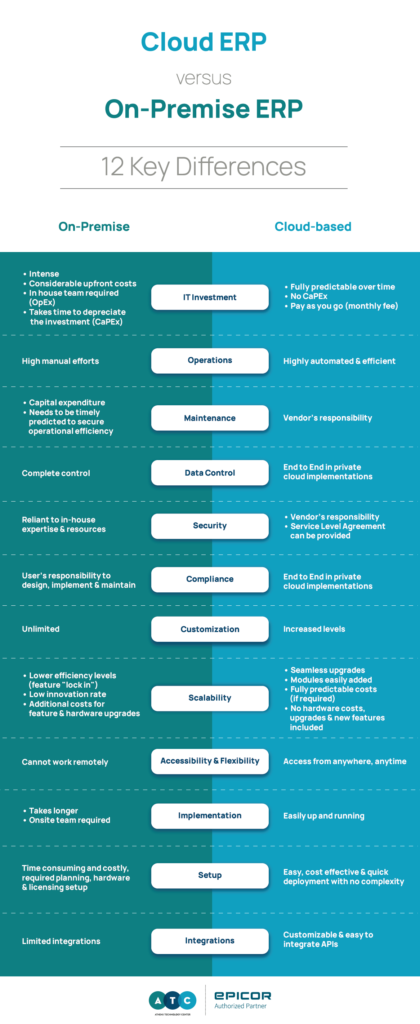When evaluating software, companies more commonly find themselves in a position of weighing a cloud offering against an on premises offering.
Manufacturers feel the challenges of limited IT resources, difficulty keeping up with the latest technology, high infrastructure costs, and excessive downtime to replace outdated systems.
Many focused studies, such as the recent Industry Insights Report published by Epicor, showcase that the vast majority of manufacturers will move all or most of their ERP technology to the cloud΄.What’s their primary objective? To can lower their total cost of ownership (TCO), reduce siloed data, and improve decision making—among other benefits.
When it comes to the cloud, surveyed businesses highlighted 4 key characteristics :
- Adaptability: Cloud delivers the flexibility to keep technology ahead
- Security: Improved security is the top recognized benefit of migration to the cloud.
- Future-Proofing: Cloud increased businesses’ opportunities for more agility and resilience.
- Partnership: The key to a successful cloud migration and implementation relies on working with a dedicated and experienced partner.
Why is the cloud-based ERP gradually taking over?
Low cost of entry
Cloud ERP is cheaper upfront, compared to major investment in an on-premises system, including perpetual license fees. In a cloud-based ERP case, you do not need to calculate any additional capital expenditure (i.e. hardware networking etc). Thanks to the SaaS provider’s subscription model, there is no need for new servers to host applications or databases, or for in house staff to install, manage and troubleshoot ERP hardware and software issues.
Scalability
No business enjoys paying for more than actually needed; at the same time, all businesses require that new functionalities or upgrades will be deployed fast, transparently and with little to no disruption. Cloud-based ERP meets these requirements, and it is easily expandable, always following your company’s growth pace or seasonality requirements.
Always on
Mobile access to on-premises ERP systems may require a third-party provider to enable communication between on-site software and mobile devices, whereas ERPs provide this access. On the other hand, the very nature of SaaS solutions allows you to access every bit of information you need from anywhere, anytime, using the device you prefer (or just the one that is available).
Evolving security
The kinds of sensitive company financial, client and employee data, as well s trade secrets and other critical information kept in ERP systems, once made business owners hesitant to make the move to a cloud-based system. However, reputable cloud ERP services vendors, have since consistently proven to keep strict and effective security standards in place that keep data safe. Companies can go even farther to secure their information by using third-party security auditors.
The True Cost of Ownership
Cloud vs On-Premises Deployment
These are actual benefits occurring as manufacturers embrace the merits of the 4th Industrial Revolution; cloud ERP implementation is becoming the obvious solution for storing and managing the ever-increasing amount of production data, while offering cost savings, opportunities to change business model, increase business flexibility and optimize performance.
Yet, in practice, the transition to the cloud is not just about moving data outside of physical infrastructure. Used properly, the cloud can improve an organization’s productivity, efficiency, and possibly its entire business model. In fact, whether it is product quality improvement, sales forecasting, or precautionary maintenance, the cloud can offer an industry a critical advantage to the industry, and possibly, a completely new sales service
Not ready to make the transition yet?
Epicor Kinetic offers you a deployment choice of public cloud, on-premises, or hybrid cloud. Hybrid cloud allows businesses to step into the cloud with extensions without running their entire ERP in the cloud. As the solution offered uses the same technology, regardless of cloud or on-premises, businesses can also choose to self-host the solution or work with a 3rd party. For example, distributed business units have deployment choices across the enterprise with some sites choosing cloud and others choosing on-premises deployment!
Read more
- Why Cloud Based ERP is Taking Over On-Premises ERP Software | Epicor
- Boyer Machine & Tool’s Recent Upgrade to Epicor Cloud ERP | Epicor
- How Cloud ERP Accelerates Growth for Medical Device Companies | Epicor
- Cloud Computing Market Size, Share and Global Market Forecast to 2026 | COVID-19 Impact Analysis | MarketsandMarkets







